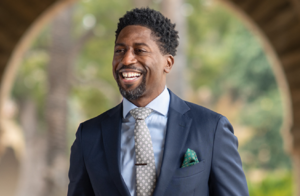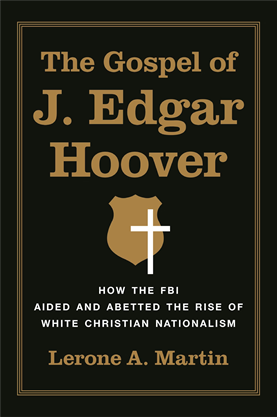The FBI and the Rise of White Christian Nationalism: A Book Talk with Dr. Lerone Martin

The idea for Dr. Lerone Martin’s new book, The Gospel of J. Edgar Hoover: How the FBI Aided and Abetted the Rise of White Christian Nationalism, arose from a combination of a friend writing a book on how African American writers had been followed and harassed by FBI agents, as well as the 2014 death of Michael Brown at the hands of police. At the time of Brown’s death, Dr. Martin was living in St. Louis and had met with ministers in the area who explained that FBI agents reached out to them with a question: “What are you going to do to help us make sure that (the city) doesn’t explode?”
The FBI’s infiltration of Black spaces and attempts at collaboration with Black church leaders is still an issue, especially around anti-police and Black Lives Matter protests. At a sponsored event by Stanford Center for Racial Justice earlier this month, Dr. Martin spoke with Stanford Law Professor Shirin Sinnar about his new book and offered important historic and contemporary lessons for people concerned with police and political violence, domestic terrorism, and persistent racism in the United States.
For the first part of the discussion, Dr. Martin spoke about his research on J. Edgar Hoover and the impact he had as the first director of the FBI, a span that started in 1924 and stretched 38 years to his death in 1972. Hoover’s impact also directly led to undermining civil rights movements and activists, most notably, Martin Luther King Jr.—whom Dr. Martin has studied extensively throughout his career and as Associate Professor of Religious Studies and Director of the Martin Luther King Jr. Research and Education Institute at Stanford.

“It was effective, too. The Washington Post ran a poll in 1965 asking Americans, ‘Who do you sympathize with: J. Edgar Hoover or Martin Luther King Jr.?’ The (majority) of those polled sided with Hoover,” Dr. Martin said. “And this is only three months after King won the Nobel Prize. Yet still, Americans for the most part, sided with Hoover as the person who was the real patriot in the country.”
Dr. Martin broke his book into three essential arguments. One: Hoover “made white Christian nationalism a bedrock of the minor modern national security state.” Two: “Hoover and white evangelicals partnered to authenticate and materially support white Christians nationally.” And three: “Hoover and the FBI were adjudicators of evangelical identity and truth, faith and allegiance,” a mission carried out by his army of “spiritual soldiers.” The reason for these practices? To Hoover, White Christian nationalism was the only way to keep Americans safe from “bitter enemies of religion” during the Cold War. Dr. Martin used phone calls from Hoover, letters by the FBI, and Hoover’s written works to establish these arguments, referring to the FBI figurehead as a self-appointed “moral custodian” for the nation.
Dr. Martin ended his discussion by explaining Hoover’s legacy with the FBI. His practices continue to loom large over how the FBI and the national security state conducts its business today, he said. Regarding personnel, Dr. Martin also shared that the majority of the FBI is still white and male (Hoover infamously did not hire any federal agents of color until Robert F. Kennedy made it a priority as Attorney General). With respect to politics, they have also been complicit in conservative extremism—or a kind of “Christian nationalism (that) has reared its ugly head and its side with a particular form of Christianity and the increasing normalization of the extreme.” He pointed to Jan. 6 as an example of how investigative priorities are still affected today and that the federal law enforcement response would have likely looked “very different” had “people of color primarily, or Muslim brothers and sisters” been the ones to storm the U.S. Capitol.
During the Q&A period, Dr. Martin explained that his book is for all people to read, enjoy, and learn from. While he mentioned the value in having a book reviewed and discussed by scholars, he also expressed that coming from a first-generation background, “I tried to write it in a way that my family members who didn’t have the opportunity to go to college or complete a college degree be able to read it and understand it.” He went on to explain that the ultimate goal of his book is to “be honest about the facts and try to also provide a way forward.”
Learn more about Dr. Martin’s new book in this video from the Stanford School of Humanities & Sciences.
